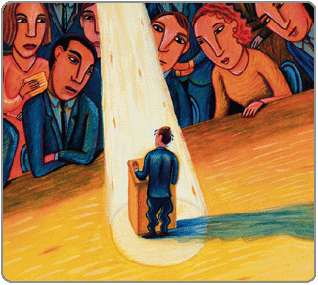Are you ashamed of revealing that you are suffering from social anxiety or experiencing traits of the disorder? Well, a certain amount of anxiety is natural for all humans.
It is tagged as social anxiety disorder solely when the level of tension begins to affect your general well-being and makes you focus your life around those social phobias.

This anxiety disorder will arise from a variety of things starting from public speaking, going on a date, showing for an audition or interview or even approaching a store manager.
Several of you may be taking sure laxity to Cure Social Phobia /Anxiety, considering it a personality trait that one is born and has to live with.
However, that is a myth and you're extremely going to make true even worse resulting in anxiety or panic attack. Therefore it's imperative to immediately go for social anxiety treatment to facilitate quick recovery.
These are the three main ways that are being employed in therapy and in at home treatment programs.
1. Cognitive Behaviour Therapy
With cognitive behaviour therapy you're taking a deep look into your mind and also the thoughts that cause your anxiety towards social things.
Social anxiety may be a mental disorder and with CBT you will re-program your thoughts towards social things.
Some strategies utilized in CBT are:
Psychoeducation : You'll be supplied with info regarding your disorder like what caused it, what you can do regarding it, what it's and how to stop recurrences.
Cognitive Restructuring: This is the method of recognizing and changing the negative thought patterns experienced in bound social situations.
Social Skills Training: Often, individuals who concern social things feel that they do not have the social skills necessary to interact with others. By working on their social skills they raise their vanity which can lead to less anxiety in social settings.
Cognitive behaviour therapy is the most common type of social anxiety treatment being used by therapists with the goal of creating long term changes in your level of social worry and facilitate your process your thoughts during a additional positive manner.
2. Neuro-Linquistic Programming
Neuro-Linquistic Programming is regarded as the most powerful and successful social anxiety treatment out there.Finding your personal power and obtaining to the root of the cause of your social worry is the main focus with NLP.
Neuro-Linquistic programming involves re-programming your thoughts so that you view social things from completely different angles so that you'll be able to modify your thought patterns which are the basis reason behind your social fear.
The final reason for the success and recognition of NLP is that while you're working towards overcoming your social phobia, you are additionally boosting your self esteem.
3. Medication
Medication is widely used as one of social anxiety treatment, and it can play an enormous role in reducing your level of anxiety whereas you are taking them.
There are several totally different medications, supplements and natural herbs that can be taken to cut back your anxiety levels and several additionally act as anti-depressants.
Some example of medication are:
Selective Serotonin Reuptake Inhibitors (SSRIs): This is the quantity one preference for medication as a result of they are effective and they do not have all the adverse aspect effects of some other anxiety medicine.
Serotonin and Norepinephrine Reuptake Inhibitors (SNRIs): Anti-depressants which work by increasing your serotonin and norepinephrine levels, chemicals that improve your mood.
Benzodiazepines: Just another name for tranquilizers. They act quickly in calming your anxiety. Unfortunately, if taken for long periods of your time they can become addictive.
Several individuals take anxiety medications on a regular basis to level their anxiety level as well on avoid panic attacks.
There are several side effects that ought to be considered about before starting a anxiety medication regimen.
You should conjointly understand that medication can not help you have long run success in overcoming your social anxiety and once you stop taking the medication the benefits conjointly stop.
Conclusion
Disorders of social anxiety can be terrible for patients and their family members. If the symptoms are not treated, they tend to worsen. That is the reason the patients should seek help as soon as possible. Medications for social anxiety treatment are definitely effective when they form a part of a composite treatment package.
Some of the methods discussed here have some very scary side effects, some are very expensive while others are much more affordable and can be done on your own in the comfort of your own home
Fortunately,I found a method that is very simple to implement that many have found to be The Answer. You can read about The Answer and how to be rid of Anxiety Attacks forever HERE














